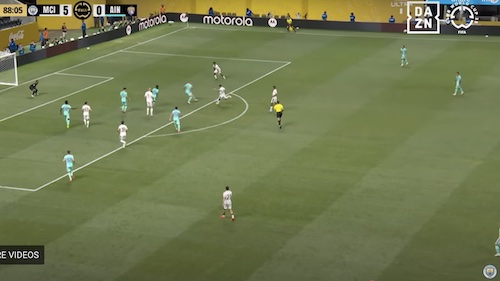|
By Paul Oberjuerge As reversals of fortune go, this was fairly astonishing. As the first day of summer dawned, Sunday, the United States national soccer team was the Official Bust of the Confederations Cup and Bob Bradley the most overmatched or underprepared coach in the tournament. The Los Angeles Times went so far as to provide a list of 12 potentially suitable replacements as coach for the clearly unsuitable Bradley and quoted a writer for England’s Daily Telegraph who described the American performance as "insipid, intimidated, ineffectual and inept." And then the final two matches of group play were played. In one of the more remarkable turnarounds in the history of U.S. international soccer, the Americans shrugged off defeats of 3-1 to Italy and 3-0 to Brazil and overpowered Egypt 3-0 while Brazil was drubbing Italy by the same score, creating the quite exacting (and quite unlikely) conditions that enabled the U.S. to outpace Italy and Egypt via tiebreakers and finish second in Group B. And now the U.S. has at least two more matches in South Africa, home of this eight-team, World Cup-warmup tournament — versus world No. 1 Spain on Wednesday and either a third-place or championship match against Brazil or South Africa. Hard to imagine the U.S. surviving streaking Spain on Wednesday, not with the Spaniards one game away from setting world records for consecutive unbeaten international matches (36) and consecutive international victories (16). But it also was hard to imagine the U.S. finishing second in a group that included Italy and Brazil, not to mention Egypt, which lost 4-3 to Brazil and stunned Italy 1-0. And even harder to imagine it before the final matches were played, and the complicated preconditions necessary for U.S. advancement were laid out — the least preposterous of which was the U.S. and Brazil each winning by 3-0 counts. Now, it turns out that Italy is the Official Bust of the tournament. The World Cup champions couldn’t score against Egypt and were overrun by Brazil, and now the Azzurri look rather less like world-beaters and more like guys who have aged quite shockingly since winning the 2006 World Cup. And the coach on the hot seat would seem to be Egypt’s Hassan Shehate, whose Pharaohs seemed thoroughly unprepared for a resurgent U.S. side, or Italy’s Marcello Lippi, who may be trying to ride his 2006 veterans too long and too hard. It is easy to imagine Egypt, champions of Africa, entering the match with the United States, champions of CONCACAF, as a bit fat-headed. Egypt had pushed Brazil into extra time before the deciding goal had been struck by Kaka from the penalty spot, and defeated Italy. While the Americans had been routed by both. Egypt was playing on its home continent, and it had a sizable following of fans at the stadium. But Egypt didn’t seem to know what to do with the gritty and determined American side that turned up in Rustenburg. It perhaps should not have been a surprise, given the Americans’ historic competitiveness against any team that isn’t 1) European or 2) Brazil or Argentina. Egypt brought to the match only a fraction of Italian guile or Brazilian technical savvy, and the Americans had time on the ball and room to maneuver that seemed almost decadent, after two suffocating matches. Two matches that also ended with the U.S. playing with 10 men. The Americans, led by captain Landon Donovan, pushed forward from the opening minutes and Egypt too easily let them. Donovan made several runs deep into the Egyptian defense, and the U.S. was creating combinations and chances previously unseen in the tournament. The first goal came after Jozy Altidore fielded a throw in deep in the Egypt end, turned the corner on a defender and rolled a centering pass to Charlie Davies, making a rare start for the national side. Davies’ first shot was parried by Egypt goalie Essam El Hadary, but it wasn’t cleared, and as the keeper got tangled up with two teammates, the ball came back to Davies, who got a foot on it and knocked it off the outstretched hand of the sprawling Hadary — and into the goal in the 21st minute. At the time, it seemed as if Davies’ second international goal might mean little more than the U.S. leaving South Africa on Monday with one positive result. Then came news of the halftime score from the match in Pretoria. Brazil held a 3-0 lead after 45 minutes, and it became clear one of the teams playing in Rustenburg — probably Egypt — was going to move into the semifinals ahead of Italy. All the Egyptians needed do was lose no worse than 2-0 or 3-1. As it turned out, the score from Pretoria served to be a greater inspiration for the Americans than the Egyptians. Still applying steady pressure, the U.S. drew to 2-0 when Donovan and Michael Bradley put on a passing clinic while moving from midfield to the box. Donovan trapped a pass and fed it back to Bradley (the coach’s son), and they advanced. About 25 yards out, Bradley gave it over to Donovan on his left, and Donovan took it into the left side of the box, drawing the attention of Egypt’s defense, before centering the ball to the onrushing Bradley, who redirected it with his right foot just inside the far post, beating the out-of-position Hadary. Now, it was on, and Egypt seemed to wilt under the pressure, giving up chance after chance and looking nothing like the team that seemed so confident against Brazil and Italy. In the 69th minute, Bob Bradley, who a day before was being fitted for a dunce’s cap, made an inspired substitution. Noticing that veteran Clint Dempsey, the Fulham midfielder, was drifting into the attack and not bothering to work back on defense, Bradley sent on midfielder Benny Feilhaber for forward Altidore, allowing Dempsey to be a forward in job description as well as personal preference. Two minutes later, the move was rewarded. U.S. right back Jonathan Spector, all alone near the touchline some 30 yards from goal, took his time and cued up a wonderful cross into the box that Dempsey ran onto and headed inside the far post. Bang. U.S. 3, Egypt 0. And if that lead as well as Brazil’s held up, the Americans were, quite improbably through to the semifinals. The final 20 minutes were occasionally frightful for the U.S. as Egypt finally shook off its torpor and generated several decent scoring chances. The Pharaohs were hampered by the injury absence of forward Mohamed Zidan, and the inability of defender Wael Gomaa to bury a header from point-blank range. It ended with Bob Bradley breaking out an enormous (and rarely seen) smile, and his players hugging each other all over the field. Group A, meanwhile, went almost exactly as expected. Spain cruised through feeble opposition, which included Asia’s fluke champion, Iraq; Oceania champion New Zealand and host South Africa. South Africa seemed at risk when Iraq, coached by defense-first veteran Bora Milutinovic, held the hosts to a scoreless draw in each team’s opener. But that "scoreless" thing was going to dog Iraq through the tournament, and Iraq ended with two points, after adding a 1-0 loss to Spain and scoreless tie with New Zealand to its ledger. South Africa, meanwhile, defeated New Zealand 2-0 on a pair of goals by Bernard Parker and advanced despite a 2-0 loss to Spain, its three points from one victory outstripping Iraq’s two from the pair of draws. The day after the U.S. meets Spain in Bloemfontein, South Africa plays what has to be the biggest match in its national team history, vs. five-time champion Brazil in the semifinals Thursday at Johannesburg. And unless another astonishing result is in the making, Brazil and Spain should meet in a tasty championship match in Johannesburg on Sunday, June 28, a fitting end to what has been by far the most interesting Confederations Cup yet staged. Paul Oberjuerge writes about soccer for the NY Times soccer blog Goal. He can be reached at: paul.oberjuerge@gmail.com |
Official Bust of the Confederations Cup?















